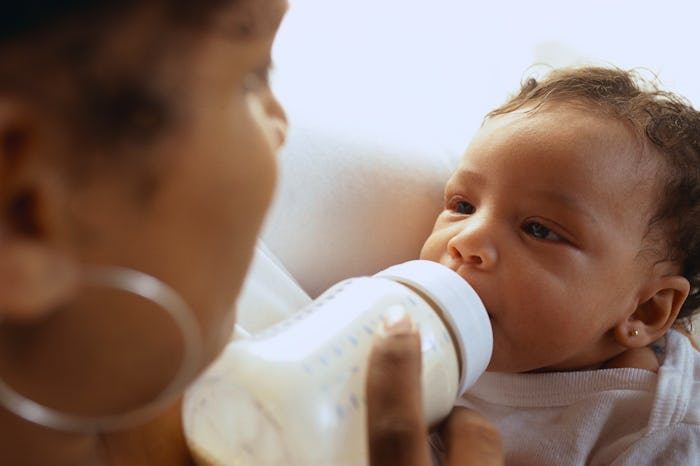Nutrition

Can Babies Drink Oat Milk Instead Of Cow's Milk?
Here’s what the experts had to say.
Oat milk can be a delicious addition to cereal, smoothies, and even lattes, so naturally many parents would like to share the tasty stuff with their children. But is oat milk safe for babies to consume in general, or do they need to wait for a little bit? Here’s what four pediatricians had to say on the subject, because meeting your child’s nutritional needs is so important.
At what age can babies consume oat milk?
Under one year of age
“Oat milk should not be given to babies. Babies should receive only breastmilk or formula until they are one year old,” Dr. Adam Spanier, pediatrician with University of Maryland Medical Center in Baltimore, tells Romper. If your baby does use formula, then there are some plant-based options available. “From my best knowledge, currently there is no oat-based infant formula,” Dr. Powen Hsueh, a pediatrician at Weed Army Community Hospital, tells Romper in an email. “I have only seen soy-based infant formula available in the US market for a plant-based infant formula.” In fact, there are quite a few soy formulas among the best baby formulas available on Amazon, such as Earth's Best Organic Soy Infant Formula. Like Dr. Hsueh said, however, there does not appear to be an oat-based baby formula on the market at the moment.
Between one to two years
What about children who are over a year old? “After 1 year of age the typical transition is to whole cow's milk. The AAP recommends consuming 16-24 oz of milk per day after 1 year of age,” as Dr. Samira Armin, board-certified pediatrician and cofounder of The PediPals, tells Romper. Could you just sub in oat milk? It isn’t an exact switch. “The recommendation for whole milk for children at age one is to help provide adequate protein, fat, calcium and vitamin D,” says Dr. Spanier. “Most oat milk has lower levels of protein, fat, and Vitamin D than whole milk does.”
What are the nutritional differences between cow and oat milk?
In fact, Dr. Hsueh provided a thorough breakdown of the nutritional differences between cow and oat milk. “Cow’s milk per ounce has about 5-6 times more fat content, 1.5x more calories, 4x more protein, and more cholesterol than oat milk. As all those nutrients are essential for young children’s growth and brain development,” says Dr. Hsueh.
So does this mean cow’s milk is absolutely necessary for your kid? Not exactly. Cow’s milk is simply one of the better nutritional sources readily available for young children, as Dr. Hsueh explains. It still doesn’t provide all the nutrients your child needs.
How to safely add oat milk (or avoid dairy) in your kid’s daily food regime
If parents want to incorporate oat milk in their child’s diet, or avoid dairy, then meet with your child’s pediatrician for advice. “For children 12 months and older, [oat milk] can be given in certain situations, such as if the child has an allergy to cow’s milk, or there are dietary regimens the child’s family may want to adhere to,” as pediatrician Dr. Tanya Roman, Chief of Pediatrics at Community Health of South Florida, Inc. (CHI), tells Romper. “But that is a decision that should be made in consultation with a medical provider such as a pediatrician. The reason for that is because oat milk, like other milk alternatives, is not nutritionally equivalent to whole cow’s milk. And so, the child’s overall nutritional plan would need to be evaluated to ensure the child is getting what they need to be healthy.” In addition, some milk alternatives contain added sugars that parents may not want to give their children, as Dr. Roman further explains. With your pediatrician’s help, however, you can find a way to feed your kid that meets all of their nutritional needs, whether or not that includes some oat milk. At any rate, they can look forward to savoring an oat milk latte or smoothie once they’re a little older.
Experts:
Dr. Samira Armin, board-certified pediatrician and cofounder of The PediPals
Dr. Powen Hsueh, a pediatrician at Weed Army Community Hospital
Dr. Tanya Roman, Chief of Pediatrics at Community Health of South Florida, Inc. (CHI)
Dr. Adam Spanier, pediatrician with University of Maryland Medical Center in Baltimore
This article was originally published on